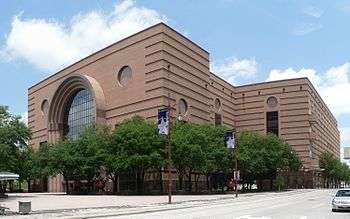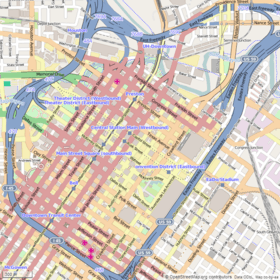Wortham Theater Center
 | |
| Address |
501 Texas Avenue Houston, Texas United States |
|---|---|
| Coordinates | 29°45′48″N 95°21′56″W / 29.76333°N 95.36556°WCoordinates: 29°45′48″N 95°21′56″W / 29.76333°N 95.36556°W |
| Owner | City of Houston |
| Operator | Houston First Corporation |
| Type | Performing arts center |
| Capacity |
Brown: 2,405 Cullen: 1,100 |
| Opened | May 5, 1987 |
| Website | |
| www.houstonfirsttheaters.com | |

The Wortham Theater Center is a performing arts center located in downtown Houston, Texas, United States. The Wortham was designed by Eugene Aubry of Morris Architects and built entirely with $66 million in private funds. The City of Houston owns the theater, and the Houston First Corporation operates the facility.
History
It officially opened on May 9, 1987, with one of the inaugural performances being a modern dance program, Tango Argentino, in the Brown Theater and Robert Wilson and David Byrne's The Knee Plays, presented by the Society for the Performing Arts in the Cullen Theater.
Significant private funding
A significant portion of the funding, needed to build the center, came from the estate of the late Gus Wortham (1891–1976), a local philanthropist and founder of American General Insurance Company. The Wortham Foundation contributed $20 million for the construction of the new Theater Center, which was named for him. In spite of the late 1980s banking and oil recession, more than 3,500 donors committed funds for the new facility in a major community effort with nearly 2,200 individuals donating $100 or less to the capital campaign. Additionally, the Cullen Foundation contributed $7.5 million, and the Brown Foundation gave $6 million to the building fund.
Performance facilities
- The Brown Theater, with 2,405 seats, is named for donors Alice and George Brown. It is used primarily for opera and large ballet productions.
- The Cullen Theater, with 1,100 seats, is named for donors Lillie and Roy Cullen. It is used for smaller ballet productions and other events.
Some additional facts about the Center
The Houston Ballet began its first season on September 2, 1987, with Janie Parker and Li Cunxin starring in the world premiere of Ben Stevenson's new production of Romeo and Juliet.[1] This was followed by Houston Grand Opera's first season, on October 15, 1987 with Plácido Domingo and Mirella Freni in a new production of Verdi's Aida.
The glass entry archway, 88-feet (27-m) tall, was originally designed[2] to be the end of a glass atrium, but the atrium concept was considered too hot for Houston's summertime weather and a danger in hurricanes, and hence the atrium was omitted during construction. There had been debate about how to re-design the entry section as a non-atrium structure, but the decision was to leave the connecting archway, as designed, and simply enclose with glass. Hence, structurally, the archway could easily be extended, in the future, if some entry structure were to be considered for addition.
The Helen Hayes Chandelier, hanging in the Green Room, was originally installed in 1911 at New York City's Fulton Theater (renamed as Helen Hayes Theatre in 1955). During the demolition of that theater, the chandelier was purchased by Houstonians Billy and Janie Price, who donated it to Wortham Center.
The grand staircase, which is actually a bank of escalators, is surrounded by a site-specific illuminated installation by renowned New York sculptor Albert Paley. To avoid extensive last-minute debates about approving the sculpture by the artwork committee, the illuminated structure was categorized as an issue of lighting/electrical design, not subject to the artwork committee's oversight.
A unique acoustical feature of the theater are its "frying pan" pods, accessible via walkways over the rear of the orchestra seating. This construction enables the music to flow between these pods and into sections of the opera hall that are traditionally not considered good listening areas.[3]
References
- ↑ "25 years later Janie Parker remembers Romeo and Juliet". Houston Ballet. Retrieved 11 March 2015.
- ↑ The Houston Chronicle (newspaper), archives, 1987.
- ↑ "Wortham Theater Acoustics Project".
External links
| Wikimedia Commons has media related to Wortham Theater Center. |
- Official Website of the Wortham Theater Center
- Houston Grand Opera's website
- Houston Ballet's website
- Albert Paley Official Website